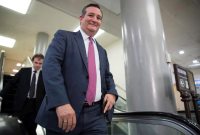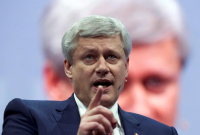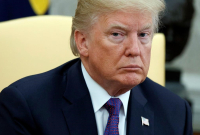Support strong Canadian climate journalism for 2025
The Canadian government produced a paper shortly after Donald Trump's election outlining in broad strokes how the incoming U.S. president could have pursued a quick, substantive, and successful renegotiation of NAFTA.
The paper was produced late last year and provides a glimpse at a now-hypothetical alternate reality where the new administration might have opted for a renegotiation by executive order, rather than the current legislative process.
It lists different areas where changes might have been achieved by executive actions: auto parts rules of origin, professional work visas, intellectual property protections, digital commerce, procurement, state-owned enterprises, and interpretations of dispute-settlement cases.
It was produced at the request of senior political officials, who in initial conversations with top-ranking members of the incoming Trump administration heard some suggest a preference for quick action that bypassed the complex legislative process.
''It never got very far,'' one Canadian official said.
But the resulting research, obtained by The Canadian Press through the Access to Information Act, offers a peek down a road not travelled. Gathered by departmental bureaucrats, it was signed by deputy trade minister Tim Sargent and date-stamped Dec. 30, 2016.
Sargent's 13-page response examines the procedural differences between legislated and non-legislated changes to NAFTA in all three countries, with half of the document specifically looking at non-legislated changes in the U.S.
It begins: ''The explanation below provides a preliminary assessment of actions that could possibly be taken to supplement or amend the NAFTA in a reasonably quick manner that also would not require Congress to act.''
It cites three ways to change a trade deal without congressional votes:
—Amendments to annexes and tariff schedules
—Country-to-country agreements that require no legislation
—Clarifying statements
It offers examples of how these three measures could achieve changes in some key areas now central to the negotiations.
But even those supposedly simpler fixes carried potential trouble.
There are still competing visions months later on how to handle auto rules, procurement, dispute-resolution, and professional visas, with no resolution yet in sight, and warnings that the talks could fall apart.
A spokesman for Foreign Affairs Minister Chrystia Freeland says a quick fix was never within reach.
''In trade negotiations there is no such thing as a quick win,'' Alex Lawrence says.
''Modern negotiations are complex, and require time and hard work.''
He says this document was simply research that flowed from the work done since the summer of 2016, when, in the midst of the U.S. election, his minister asked for a wide-ranging review of possible procedural outcomes for NAFTA.
The Canadian official agreed that an insta-negotiation was always a longshot. For example, even one of the people in Trumpworld who supported the idea of a speedy process, Peter Navarro, is a well-known trade hawk who also favours an aggressive U.S. posture.
It's all history now, anyway.
One source said the idea of a quick executive-to-executive agreement virtually vanished from the conversation, and never came up seriously in subsequent weeks while the countries planned Prime Minister Justin Trudeau's first visit to the Trump White House.
One of Washington's foremost trade experts, at the time, publicly predicted that a quickie deal was impossible. Gary Hufbauer of the Peterson Institute said American lawmakers would insist on playing a role, given that international trade belongs to Congress under the U.S. Constitution.
''I can't anticipate what the problems are going to be, but there's going to be problems,'' he said in an interview, speaking right after Trump attempted to reassure his northern neighbour that he just wanted a few tweaks to trade with Canada.
''That's a Pandora's box — once you open it, everything's open. How can you say, 'We want to reopen NAFTA for you, you and you – and all you other guys, go play in traffic?' You can't.''
Now some lawmakers are urging the president not to act on his oft-repeated threat — to cancel NAFTA as a negotiating ploy.





Comments